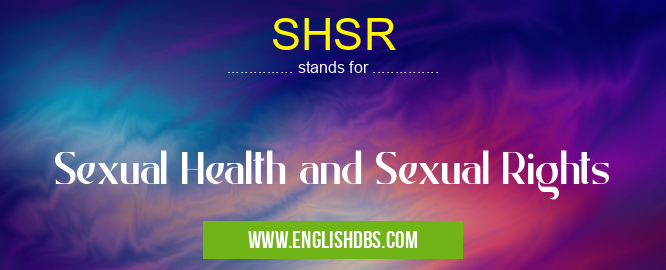What does SHSR mean in HEALTHCARE
Sexual health is the state of physical, emotional, mental and social well-being in relation to sexuality; it is not merely the absence of disease, dysfunction or infirmity. Sexual health requires a positive and respectful approach to sexuality and sexual relationships, as well as the possibility of having pleasurable and safe sexual experiences, free of coercion, discrimination and violence.

SHSR meaning in Healthcare in Medical
SHSR mostly used in an acronym Healthcare in Category Medical that means Sexual Health and Sexual Rights
Shorthand: SHSR,
Full Form: Sexual Health and Sexual Rights
For more information of "Sexual Health and Sexual Rights", see the section below.
» Medical » Healthcare
Essential Questions and Answers on Sexual Health and Sexual Rights in "MEDICAL»HEALTHCARE"
What is Sexual Health?
What are Sexual Rights?
Sexual rights embrace human rights that are already recognized in national laws, international human rights documents and other consensus documents. These rights include the right to autonomy and bodily integrity; freedom from torture and cruel, inhuman or degrading treatment; privacy; equality before the law; access to justice; access to information; and the right to education.
How are Sexual Health & Rights related?
Ensuring everyone's rights enhances their control over their sexual lives—which has far-reaching implications for their overall health and wellbeing both physical, mental and emotional. Similarly, safeguarding everyone's sexual health can be achieved by upholding their fundamental sexual rights. It cannot be overemphasized that a holistic approach focusing on both sexual health & rights would lead to greater improvements in an individual's overall wellbeing.
What action can I take today with regard to SHSR?
There are many ways you can take action today regarding SHSR. You can start by educating yourself about these topics. Find out more about your own country's laws concerning these areas so that you may speak up when necessary against abuses or inequalities related to them. You can also support organizations working towards providing legal protection for these vulnerable groups with regard to these issues or provide voluntary service where possible in such capacities.
How does HIV/AIDS affect SHSR?
HIV/AIDS disproportionately affects people's ability to realize their sexual health & rights due a number of factors such as stigma associated with HIV infection resulting in discrimination which limits access to healthcare services including prevention programmes like condom distribution leading ultimately leading to higher risks of acquiring HIV infections along with other forms of sexually transmitted illnesses if preventive methods remain unutilized.
What kind of tools are available globally for SHSR?
There are several global commitments available across various UN resolutions such as World AIDS Day Declaration (since 1988), Programme Of Action Of The International Conference On Population And Development (ICPD) (1994), Beijing Platform For Action (1995), Millennium Declaration (2000), Convention on Elimination Of All Forms Discrimination Against Women (CEDAW) etc., which provides countries frameworks for improved policies concerning SHSR through provisions such as decriminalization of sex work, recognition for Lesbian Gay Bisexual Transgender Queer Intersex population's human rights etc.
Why is it important that we focus on Sexual Rights?
It is important that we focus on sexual rights because they concern a range of issues directly linked with one another including freedom from exploitation/abuse/violence, equal access/opportunity, dignity/respect, bodily autonomy, inclusion/non-discrimination, reproductive choices etc., without which individuals may not be able maximize exercise agency over their own body thus denying them basic human needs resulting in poor overall wellness outcomes violating human decency standards.
What can governments do better with regards SHSR?
Governments should strengthen implementation measures through enactment of proactive legislation encompassing all aspects related to this area along with meaningful financing strategies targeting stigma reduction campaigns promoting open dialogue among stakeholders and affected populations so that individuals may have greater integration into respective societies being benefitted from improved equitable public service delivery systems.
Is it possible for non-governments actors help promote SHSR initiatives as well?
- Yes! Non-government actors play an equally critical role towards furthering progress within this area through direct engagement providing expertise guidance where needed combined with amplifying collective voice efforts via campaigns advocating change at policy level coupled with meaningful collaborative technology driven solutions ideally benefiting under served communities most urgently needing improved quality life affirming support structures.
Where can I find reliable resources regarding latest developments in this field?
- Many sources exist covering broad array topics within bodies like United Nations Organisation network entities such World Health Organisation (WHO), United Nations Entity For Gender Equality & Empowerment Of Women(UN Women ) amongst others who publish regular reports carrying insights pertaining latest developments while various research based academic institutions facilitating studies surveys lending valuable information data all above currently being referenced internet via dedicated webpages primarily providing insights improving conditions worldwide.
